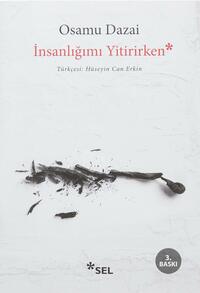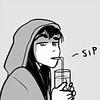You need to sign in or sign up before continuing.
Take a photo of a barcode or cover
dark
sad
medium-paced
Plot or Character Driven:
Character
Strong character development:
Complicated
Loveable characters:
No
Diverse cast of characters:
No
Flaws of characters a main focus:
Yes
a book that wants itself to be a psychological reflection on life and humanity, but fails terribly at it.
from what i've gathered, what the title "no longer human" entails is closer to arrogance and hubris than just pure incomprehension. or rather, the main character felt so inferior to the general population that his knee-jerk reaction was so develop a superiority complex.
basically, this was the most detestable character i've ever read about. obviously i know having compassion for him was certainly not the main goal here, but i just felt increasingly irritated by his antics.
to put it plainly: this is pretty much just the biography of an incel.
No Longer Human or What happens when the masquerade devours its performer
If history - and, eventually, bad advice from friends - taught me anything, it’s that the inability to say no can take you many places. Often times, it leads to awkward dinner parties, other times it leads to becoming an important pawn in the communist party and, sometimes, it leads to a slow, elegantly narrated descent into self-destruction, shame and alienation.
A sandwich structure of despair
No Longer Human is a story told like a literary sandwich - the bread being the prologue and epilogue, narrated from the detached perspective of a stranger, while the filling consisting of Oba Yozo’s, the main character, own first-person account of his unraveling. Like a sandwich, the outside feels polite and distant, while the inside is messy, raw and leaves stains on your hands (in this case, your mind).
Yozo’s narrative voice is startingly formal, detached, almost polite, even as he catalogues his progressive failings and, for the level of despair and atrocious events he describes - addiction, betrayals, failed suicides - the tone remains characterized by subdued politeness, which makes the book terrifying.
His desperate strategy of existing through jesting becomes his whole survival system and his defense mechanism is simple, yet disturbingly relatable:
The book felt like a confession that reads almost absurd at first but then becomes uncomfortably familiar - who hasn’t at some point laughed too loud, agreed too quickly, or gone along with something just to avoid disapproval? Yozo takes the fear to its extreme, until the inability to refuse becomes a straight road towards ruin.
Hypocrisy, Then and Now
I loved how Dazai skewers another universal vice - the hypocrisy of social behavior. Yozo recalls, with a mixture of bewilderment and dread, how his cousins would invite friends over, shower them with smiles and compliments, and immediately mock them once they left. And here we are, decades later, recognizing the same gesture: the cheerful smile, the “we must do this again soon” and the sudden wave of whispered judgement as soon as the door closes. It’s a small moment, but it connects his sense of alienation with something frighteningly familiar - the hypocrisy of social niceties isn’t just his family’s problem, it’s the very stage upon which normal human behavior seems to be performed. And Yozo, lacking the instinct or desire to perform, finds himself outside the human circle.
Living with the Void
Here’s my confession: days after finishing this book, and I’m sill conflicted. I wanted to hate Yozo, call him selfish, cruel and irresponsible - especially in the way he treats women, yet, the void that he describes, that hollow ache at the core of his being made me hesitate. Evidently, it doesn’t excuse his actions, but it complicates them and raises the question - what is evil when it sprouts not from malice, but from alienation, shame and compulsive need to vanish into other’s expectations?
Mishima once said of Dazai that what he despised most about him was the way he exposed precisely the traits he (Mishima) wanted to conceal in himself - and maybe that’s what unsettles me, the book doesn’t let us safely distance ourselves, but rather forces the mirror closer.
The tragic comedy of decline
The irony is that Yozo begins as the jester - a figure who survives by making others laugh, by disguising his alienation with performance - but once the mask slips, the laughter curdles. The comedy of self-effacement reveals itself as the slow suicide of someone who cannot stand in his own skin. It’s darkly funny in the way Kafka is funny - if you laugh, it’s because you’ve recognized something far too close to comfort.
So, here I am, days later, not quite sure whether I love or loathe this book and maybe that is the point: Dazai doesn’t ask for sympathy, but rather for confrontation – with alienation, with shame, with our private non-human moments; and, while I might have wished to stay detached, the book slipped past my defenses, the way Yozo slips past his readers’ disgust with his strangely polite despair.
“My unhappiness was the happiness of a person who could not say no. I had been intimidated by the fear that if I declined something offered me, a yawning crevice would open between the other person's heart and myself which could never be mended through all eternity.”
If history - and, eventually, bad advice from friends - taught me anything, it’s that the inability to say no can take you many places. Often times, it leads to awkward dinner parties, other times it leads to becoming an important pawn in the communist party and, sometimes, it leads to a slow, elegantly narrated descent into self-destruction, shame and alienation.
A sandwich structure of despair
No Longer Human is a story told like a literary sandwich - the bread being the prologue and epilogue, narrated from the detached perspective of a stranger, while the filling consisting of Oba Yozo’s, the main character, own first-person account of his unraveling. Like a sandwich, the outside feels polite and distant, while the inside is messy, raw and leaves stains on your hands (in this case, your mind).
“Mine has been a life of much shame. I can't even guess myself what it must be to live the life of a human being.”
Yozo’s narrative voice is startingly formal, detached, almost polite, even as he catalogues his progressive failings and, for the level of despair and atrocious events he describes - addiction, betrayals, failed suicides - the tone remains characterized by subdued politeness, which makes the book terrifying.
His desperate strategy of existing through jesting becomes his whole survival system and his defense mechanism is simple, yet disturbingly relatable:
As long as I can make them laugh, it doesn’t matter how, I’ll be alright. If I succeed in that, the human beings probably won’t mind it too much if I remain outside their lives. The one thing I must avoid is becoming offensive in their eyes: I shall be nothing, the wind, the sky.”
The book felt like a confession that reads almost absurd at first but then becomes uncomfortably familiar - who hasn’t at some point laughed too loud, agreed too quickly, or gone along with something just to avoid disapproval? Yozo takes the fear to its extreme, until the inability to refuse becomes a straight road towards ruin.
Hypocrisy, Then and Now
I loved how Dazai skewers another universal vice - the hypocrisy of social behavior. Yozo recalls, with a mixture of bewilderment and dread, how his cousins would invite friends over, shower them with smiles and compliments, and immediately mock them once they left. And here we are, decades later, recognizing the same gesture: the cheerful smile, the “we must do this again soon” and the sudden wave of whispered judgement as soon as the door closes. It’s a small moment, but it connects his sense of alienation with something frighteningly familiar - the hypocrisy of social niceties isn’t just his family’s problem, it’s the very stage upon which normal human behavior seems to be performed. And Yozo, lacking the instinct or desire to perform, finds himself outside the human circle.
Living with the Void
Here’s my confession: days after finishing this book, and I’m sill conflicted. I wanted to hate Yozo, call him selfish, cruel and irresponsible - especially in the way he treats women, yet, the void that he describes, that hollow ache at the core of his being made me hesitate. Evidently, it doesn’t excuse his actions, but it complicates them and raises the question - what is evil when it sprouts not from malice, but from alienation, shame and compulsive need to vanish into other’s expectations?
Mishima once said of Dazai that what he despised most about him was the way he exposed precisely the traits he (Mishima) wanted to conceal in himself - and maybe that’s what unsettles me, the book doesn’t let us safely distance ourselves, but rather forces the mirror closer.
The tragic comedy of decline
The irony is that Yozo begins as the jester - a figure who survives by making others laugh, by disguising his alienation with performance - but once the mask slips, the laughter curdles. The comedy of self-effacement reveals itself as the slow suicide of someone who cannot stand in his own skin. It’s darkly funny in the way Kafka is funny - if you laugh, it’s because you’ve recognized something far too close to comfort.
So, here I am, days later, not quite sure whether I love or loathe this book and maybe that is the point: Dazai doesn’t ask for sympathy, but rather for confrontation – with alienation, with shame, with our private non-human moments; and, while I might have wished to stay detached, the book slipped past my defenses, the way Yozo slips past his readers’ disgust with his strangely polite despair.
challenging
dark
medium-paced
Plot or Character Driven:
Character
Strong character development:
No
Loveable characters:
No
Diverse cast of characters:
No
Flaws of characters a main focus:
Yes
dark
emotional
reflective
sad
medium-paced
Plot or Character Driven:
Character
I have no coherent words beyond the fact that I fucking loved it. It's a fucked up little book about a depressively fucked up guy, so while it feels odd to say I fucking loved reading it, it's the only accurate phrase for how I felt having read it. I just fucking loved it.
Maybe this book isn't for me. Guess I am the society this dude was talking about because "the audacity of him talking like that?" Simply put he is a man and being a man he considers women as objects. Who doesn't love that huh? But for some odd reason I do have a little sympathy for this man.
challenging
dark
sad
tense
fast-paced
Plot or Character Driven:
Character
Strong character development:
Yes
Loveable characters:
No
Diverse cast of characters:
N/A
Flaws of characters a main focus:
Yes
dark
emotional
sad
fast-paced
honestly? it was depressing in a way where it was boring. like the entirety of the book was just about this guys crippling anxiety and depression getting worse overtime, but its so fast paced and worded in a way that kinda made me just go like "yeah ok i get it u wanna die"
but some parts of it were also relatable and actually made me feel something, which is why i didnt give it a 1 star.
it was written poetically too
but some parts of it were also relatable and actually made me feel something, which is why i didnt give it a 1 star.
it was written poetically too







